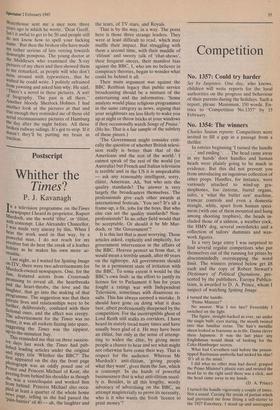Postscript
Whither the Times?
P. J. Kavanagh
In a television programme on the Times newspaper I heard its proprietor, Rupert Murdoch, use the world 'elite', or 'elitist, With contempt. Like Alexander Chancellor, I was made very uneasy by this. When I hear the work used in that way, by a Powerful man, I do not reach for my revolver but do hear the creak of a leather holster as he makes his own more ac- cessible.
Last night, as I waited for Spitting Image On ITV, there were two advertisements for Murdoch-owned newspapers. One, for the Sun, featured actors from Crossroads Promising to reveal all, the heartbreaks and the heart-throbs, the love and the laughter, that go into the making of that Pr?gramme. The suggestion was that their Private lives and relationships were to be further, deliberately, confused with their The ones, and the effect was creepy. the advertisement for the Times was no better, it was all rockets fizzing into space, suggesting the Times was the zippiest, lip-to-the-minutest buy. This reminded me that on three success- lye days last week the Times had pub- lished leading articles under the original and zippy title 'Whither the BBC?' The first appeared on the day the front page photograph was an oddly posed one of Pnnce and Princess Michael of Kent, she Pe, ering from behind his shoulder as though s,ne was a ventriloquist and worked him from behind. Princess Michael also occu- pied at least a quarter of the whole home ews page, telling us she had passed the 'pain-barrier of 40— ah, the laughter and the tears, of TV stars, and Royals.
That is by the way, in a way. The point here is those three strange leaders. They were at least difficult to read, which may muffle their impact. But struggling with them a second time, with their muddle of 'elitism' and snooty talk of `chat-shows', their frequent sneers, their manifest bias against the BBC, I, who am no believer in conspiracy theories, began to wonder what could be behind it all.
Their main argument was against the BBC Reithian legacy that public service broadcasting should be a mixture of the entertaining and the informative. 'Some analysts would place religious programmes in the same category as news, arguing that your neighbours are less likely to wake you up at night or throw bricks at your windows if they occasionally watch Songs of Praise.' (Ho ho. That is a fair sample of the subtlety of these pieces.) 'The Government might consider criti- cally the question of whether British televi- sion really is better than that of the Americans and the rest of the world.' I cannot speak of the rest of the world (or Australia) but French and Italian television is terrible and in the US it is unspeakable — ask any reasonably intelligent, sorry, elitist, American. Ah, 'but who sets the quality standards? The answer is very largely the broadcasters themselves. The professionals give each other awards at international festivals.' You see? It's all a frame-up, a fix, jobs for the boys. But who else can set the quality standards? Non- professionals? In no other field would that be acceptable. Or should it be Mr Mur- doch, or 'the Government'?
It is this last that is most worrying. These articles asked, explicitly and implicitly, for government intervention in the affairs of the BBC. Heaven protect us from that, it would mean a terrible smash, after 60 years on the tightrope. All governments should be in a permanent state of irritation with the BBC. To some extent it would be the BBC's own fault: in the effort to justify its licence fee to Parliament it has for years fought a ratings war with Independent Television, sometimes with disastrous re- sults. This has always seemed a mistake. It should have gone on doing what it does best, albeit professionally sharpened by the competition. For the incorruptible ghost of Lord Reith still stalks its corridors. I have heard its stately tread many times and have usually been glad of it. He may have been an elitist, but only in the sense of attemp- ting to widen the elite, by giving more people a chance to hear and see what might not otherwise have come their way. That is respect for the audience. Whereas Mr Murdoch's anti-elitism, 'giving people what they want', gives them the Sun, which is contempt. In the hands of powerful businessmen that is what anti-elitism usual- ly is. Besides, in all this lengthy, wordy advocacy of advertising on the BBC, an attempt magisterially to prove its necessity, who is it who wants the fresh 'licence to print money'?










































 Previous page
Previous page